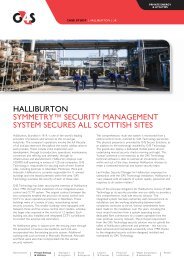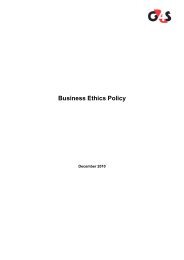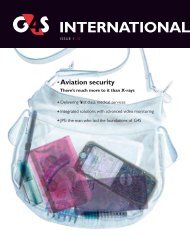G4S Annual Report and Accounts 2011
G4S Annual Report and Accounts 2011
G4S Annual Report and Accounts 2011
Create successful ePaper yourself
Turn your PDF publications into a flip-book with our unique Google optimized e-Paper software.
Overview Strategic review Performance<br />
Corporate governance statement continued<br />
Conflicts of interest<br />
Each of the directors has disclosed to the board any situations which apply<br />
to them as a result of which they have or may have an interest or position<br />
which conflicts or may conflict with the interests of the company. In<br />
accordance with the company’s articles of association, the board has<br />
authorised such matters. The affected directors did not vote when their<br />
own positions were considered. Where the board deemed it appropriate,<br />
such authorisation was given subject to certain conditions. The board<br />
reviews such matters on a regular basis.<br />
Board meetings, information flow, development<br />
<strong>and</strong> induction<br />
Meeting attendance<br />
Scheduled<br />
meetings<br />
Unscheduled<br />
meetings<br />
Executive directors<br />
Nick Buckles (CEO) 6/6 7/7<br />
Trevor Dighton (CFO) 6/6 7/7<br />
Grahame Gibson (COO) 6/6 7/7<br />
Non-executive directors<br />
Alf Duch-Pedersen (chairman) 6/6 7/7<br />
Lord Condon 6/6 7/7<br />
Mark Elliott 6/6 7/7<br />
Winnie Fok 5/6 3/7<br />
Bo Lerenius 6/6 7/7<br />
Mark Seligman 6/6 7/7<br />
Clare Spottiswoode 5/6 4/7<br />
Board meetings <strong>and</strong> information flow<br />
Six scheduled board meetings were held during the year ended<br />
31 December <strong>2011</strong> <strong>and</strong> there were a further seven additional meetings.<br />
One of the scheduled meetings was an extended, two day, off-site board<br />
<strong>and</strong> strategy session at which presentations on the development <strong>and</strong><br />
implementation of the company’s strategy were made to the board by<br />
senior executives <strong>and</strong> the board debated the company’s strategy <strong>and</strong><br />
business plans. Each of the non-executive directors has undertaken an area<br />
of special interest in relation to the group’s activities. In some cases this<br />
relates to a particular geography about which the director has intimate<br />
knowledge, in others it relates to business activities in which the director<br />
has great experience. To further their underst<strong>and</strong>ing of the group <strong>and</strong> their<br />
relationship with the operating businesses, some were able to attend<br />
meetings <strong>and</strong> conferences held by various regions <strong>and</strong> business units,<br />
following which they reported back to the board on matters of interest.<br />
Prior to each meeting, comprehensive board papers are circulated to<br />
the directors addressing not only the regular agenda items on which the<br />
executives will report, but also details of any areas requiring approval or<br />
decisions such as significant acquisitions or important market issues. At each<br />
meeting, the board then receives reports from the chief executive, the chief<br />
financial officer <strong>and</strong> the company secretary, an HR report which includes<br />
summaries of developments on HR <strong>and</strong> health & safety matters <strong>and</strong> an<br />
investor relations report which includes analysts’ reviews <strong>and</strong> any comments<br />
received from major shareholders since the previous board meeting. After<br />
meetings of the board committees, the respective committee chairmen<br />
report to the board on the matters considered by each committee.<br />
In addition, each month the board receives management accounts, trading<br />
<strong>and</strong> financial updates, investor relations <strong>and</strong> HR reports.<br />
There are seven board meetings scheduled for the current year, including<br />
an extended strategy review session.<br />
Induction <strong>and</strong> professional development<br />
When new non-executive directors are recruited, they have the<br />
opportunity to spend time with the executive directors to underst<strong>and</strong> the<br />
business, its structure <strong>and</strong> people as well as the company’s strategy <strong>and</strong><br />
financial performance. In addition, they visit businesses, usually within a<br />
number of countries, so they can begin to get a feel for the group’s<br />
operations. Meeting regional <strong>and</strong> country staff continues throughout a<br />
director’s time on the board, as does continuing professional development<br />
usually in areas where the director has specific committee responsibility.<br />
Risk management <strong>and</strong> internal control<br />
The directors acknowledge their responsibility for the group’s system of<br />
internal control <strong>and</strong> for reviewing its effectiveness. The system is designed<br />
to manage rather than eliminate the risk of failure to achieve business<br />
objectives <strong>and</strong> can only provide reasonable <strong>and</strong> not absolute assurance<br />
against material misstatement or loss.<br />
The risks associated with the group’s activities are reviewed regularly by the<br />
board, which assesses the group’s risk appetite/tolerance, considers major<br />
risks <strong>and</strong> evaluates their impact on the group. Policies <strong>and</strong> procedures,<br />
which are reviewed <strong>and</strong> monitored by the head of group internal audit, are<br />
in place to deal with any matters which may be considered by the board to<br />
present significant exposure.<br />
The key features of the group’s risk management process, which was in<br />
place throughout the year under review <strong>and</strong> since, are:<br />
uu<br />
uu<br />
uu<br />
uu<br />
uu<br />
A common risk management framework* is used to provide a profile<br />
of those risks which may have an impact on the achievement of<br />
business objectives.<br />
Each significant risk is documented, showing an overview of the risk, how<br />
the risk is managed, <strong>and</strong> any improvement actions. Risk appetite/tolerance<br />
is considered in the context of the net (after controls <strong>and</strong> mitigation) risk<br />
with a particular focus on “High” net risks. To be categorised as “High”,<br />
a risk must meet at least one of the following criteria:<br />
1. major impact on the achievement of the business strategy;<br />
2. serious damage to business reputation;<br />
3. severe business disruption; or<br />
4. impact of > 5% on operating profit or assets.<br />
Risk profiles ensure that internal audit reviews of the adequacy, application<br />
<strong>and</strong> effectiveness of risk management <strong>and</strong> internal controls are targeted<br />
on key risks.<br />
Risk management committees have been established at regional <strong>and</strong><br />
group level. The regional committees meet at least annually <strong>and</strong> the group<br />
committee meets quarterly. A st<strong>and</strong>ard agenda covering risk <strong>and</strong> control<br />
issues is considered at each meeting <strong>and</strong> risk profiles are reviewed <strong>and</strong><br />
updated at each meeting.<br />
Risk <strong>and</strong> control self-evaluation exercises are undertaken for each<br />
operating company, for most companies at least twice a year, <strong>and</strong> updated<br />
risk profiles are prepared. Similar exercises are undertaken as part<br />
of the integration process for all major acquisitions. The results of the<br />
company risk evaluations are assessed by the regional risk management<br />
committees*.<br />
*Because <strong>G4S</strong> Government Solutions, Inc. (“GSI”) is governed through a proxy agreement<br />
under which the group is excluded from access to operational information, it is not subject<br />
to the same risk management process as is applied to other group companies. The board<br />
has however satisfied itself as to the adequacy of the internal control processes adopted by<br />
GSI which include a risk review by an external advisor.<br />
58<br />
<strong>G4S</strong> plc<br />
<strong>Annual</strong> <strong>Report</strong> <strong>and</strong> <strong>Accounts</strong> <strong>2011</strong>











